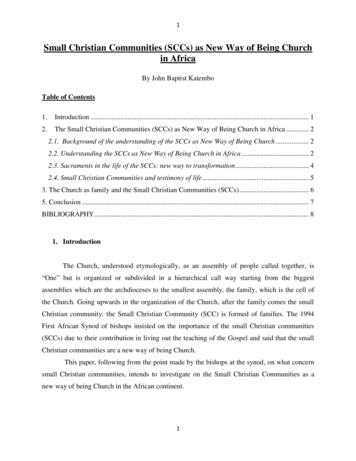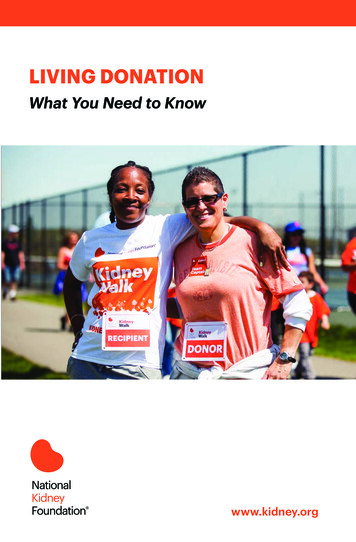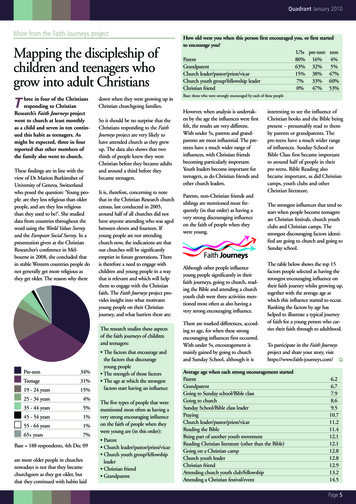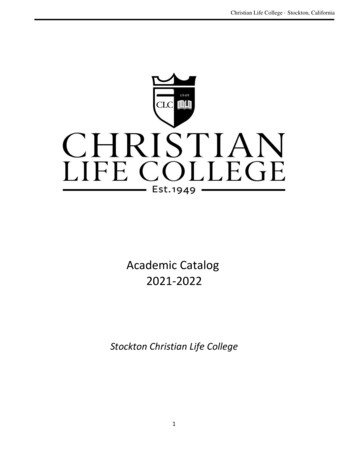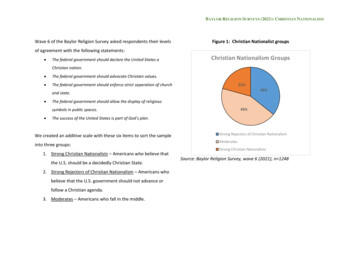
Transcription
If you were blessed by this lesson study, you may enjoy continuing onwith other studies available through Lighted Way Ministries.CHRISTIAN LIVING BIBLE STUDIES Christian Living Study Guide 1: “You Can Avoid a Shipwrecked Life” (Gaining a Clear Conscience) Christian Living Study Guide 2: “Keys to Finding True Success in Your Life” (Engrafting Scripture) Christian Living Study Guide 3: “Finding Shelter Under HisWings” (Protection Under GOD’s Authority) Christian Living Study Guide 4: “Yielding Rights to Conquer Anger” (Overcoming Wrath) Christian Living Study Guide 5: “Overcoming Bitterness &Triumphing in Suffering” (Suffering With Grace) Christian Living Study Guide 6: “Pathway toPeace” (Freedom From Moral Impurity) Christian Living Study Guide 7: “Designed On Purpose”(Accepting GOD’s Design) Christian Living Study Guide 8: “How to Speak so GodWill Listen and Listen so God Will Speak” (Principles forPrayer)Lighted Way MinistriesP.O. Box 742Canyonville, OR 97417www.lightedway.orgChristian Living Study Guide 1:“Gaining a Clear Conscience”
LESSON STUDY—1 continuedHaving abefore God and man is so important that the apostle Paul referred to itas a powerful weapon in the fight of faith. In fact, without it, Paulwarned that a life is shipwrecked!6) Why is it important to deal with and forgive offenses against me beforeI can consider what I have done to cause offense in the other person(question 6, p 6)?“(Hold) faith, and a GOOD CONSCIENCE; which some having put awayconcerning faith have made shipwreck,” 1 Timothy 1:19.7) What are the two eternal goals in making a confession to those I’ve offended (page 7)? 1. What does it mean to have a good or pureconscience?ANSWER: A “good conscience” is from the Greek word ayagos meaning a“strong, healthy” conscience that is without any offense toward God and toward men. Acts 24:16 “And herein do I exercise myself, to have always a conscience void of offence toward God and toward men.”No one has lived so perfectly as to havenever wronged anyone. But the term “pureconscience” (2 Timothy 1:3) is from theGreek word kauapos, meaning “cleansed orpurged.” God instructs us to purge our consciences (in the Blood of the Lamb) fromour past dead works so that we can serve theliving God. Hebrews 9:14 “How much moreshall the Blood of Jesus (Yahshua),Who through the eternal Spirit offered Himself without spot to God, purge your conscience from deadworks to serve the living God?”DEFINITION OF A CLEAR CONSCIENCE: When you can look all peoplein the eye knowing they cannot accuse you of having done them wrong without trying to make it right.28) Why does restitution involve restoring more than was originally taken(question 11, p 10)?9) What is the “mirror” GOD would have me use to view my offenses intheir true nature (question 7, p 7)?10) What are the steps I should take in gaining a clear conscience? Prayerfully determine(question 5, p 4).List(question 6, p 6).Comprehend and list(question 7, p 7).Work out a plan(question 10, p 9).Ask forgiveness, starting with(question 12, p 11).Pray and(question 13, p 11).15
IT HAPPENED SO LONG AGO, IT DOESN’T MATTER NOWWhen you have prayed and asked God to reveal your offenses, all offenses Hereveals are important to take care of. As it says in Matthew 5:23,“Therefore if thou bring thy gift to the altar, and THERE REMEMBERESTthat thy brother hath aught against thee ”2. When should we seek a good conscience?ANSWER: Right away! Having a clear conscience is so important thatGod doesn’t even want us to worship Him until we have first made our offenses right with the people we’ve wronged. Thus, if we wish to serve God,having a clean conscience should be a very high priority. LESSON STUDY—11) What did Paul warn could happen if a person doesn’t hold faith and agood conscience (1 Timothy 1:9):2) What does it mean to have a “good conscience,” according to Acts 24:16?3) How urgent is it to take the time to confess our past wrongs to thosewe’ve offended (Matthew 5:23-24)?4) What five things does GOD take into account in having a clear conscience before Him (see question 3, p 3): 5) What are the 8 godly attitudes one must have to approach an offendedperson and make things right (question 4, p 3-4)? 14Matthew 5:23-24“Therefore if thou bring thy gift to the altar, andthere rememberest that thy brother hath ought against thee; leavethere thy gift before the altar, and go thy way; first be reconciled tothy brother, and then come and offer thy gift.”3. What is involved in having a conscience voidof offense?ANSWER: God takes into account our thoughts, words, actions, attitudes,and motives. Where we have done wrong to God or man in any of thesefive areas, we must confess it and prayerfully do all we can to make it right. EVERY THOUGHT should be made right—2 Corinthians 10:5.EVERY WORD will be accounted for—Matthew 12:36EVERY ACTION will be judged—2 Corinthians 5:10EVERY ATTITUDE is read by Heaven—Proverbs 6:13-14EVERY MOTIVE is to be established in righteousness—Jer. 17:9104. What are the 8 attitudes necessary to gaininga clear conscience?ANSWER: They are listed in Matthew 5:3-10. These right attitudes are soimportant in gaining a clear conscience that you should not even begin contacting those you’ve wronged until you first prayerfully seek to have these 8attitudes. When you ask a person to forgive you, be: POOR IN SPIRIT—like a beggar, who is grateful for what is given,not demanding of the person’s forgiveness.TRULY MOURNFUL FOR YOUR WRONGS—ask the HolySpirit to show you your offenses through Heaven’s and the otherperson’s eyes. This vision will break the hardness of the heart.MEEK—fully yield your rights to God’s control. Usually thosewe’ve wronged have violated our rights in some way. Yield rights.3
SPIRITUALLY HUNGRY—when you long to please GOD and wantHis righteousness so much it’s like a hunger (which doesn’t diminishwith time), you will want it badly enough to do what it takes to makeyour past wrongs right.MERCIFULNESS—Showing mercy is not getting the punishment wedeserve. When you seek forgiveness with those you’ve wronged,you’re asking for mercy from them. But, you also must show mercytowards them for their offenses toward you as well.PEACEMAKING—The purposeof seeking forgiveness isn’t just tohave gone through the motions, itis about seeking to bring peace andeven salvation to the hearts ofthose you’ve offended. A rightconfession will bring peace to theheart, delivering from all bitternessand wrath.PURITY IN HEART—Seeking aclear conscience isn’t just aboutremoving the pressure of guilt. It isabout dealing with the root problems which caused the offense inorder to completely restore the onewhom we’ve offended.WILLINGNESS TO SUFFER—Seeking forgiveness, in the truesense of the word, involves making restitution for our wrongs. Thisprocess may cost us something. Be willing to do whatever it takes tomake your past wrongs right, no matter the cost.5. What is the first step?ANSWER: The first step is to determine whom we’ve wronged. We cannot determine whom we’ve wronged simply by introspection. This is measuring our wrongs against what we think is right or wrong. The Bible tells us notto use this standard of measurement in 2 Corinthians 10:12:“For we dare not compare ourselves with some that commendthemselves: but they measuring themselves by themselves, and comparing themselves among themselves, are not wise.”4Choose to contact the offended person with either a phone call or a personalvisit. Of these options, the personal visit is most ideal. By speaking directlywith the individual, your sincerity comes through in voice and body language. Clarification can take place, if needed. And it is possible to gain theverbal assurance that you are forgiven at the end.14. How to avoid the pitfalls of pride.Because genuine repentance is so big in freeing hearts from bitterness andbringing about restoration, the enemy of souls will work to prevent it fromtaking place. One of the main ways the devil does this is through manifesting pride in the heart of the potential confessor (you). If he can get you torationalize away your need to make this confession, he will prevent the restorative workings of Divine grace from fully touching your life, or thelives whom you’ve offended. Here are some prideful ways the enemytempts us to rationalize away our need for confession:IT HAPPENED BEFORE I WAS A CHRISTIANHaving become a Christian is allthe more reason to seek a conscience “void of offense with GODand man.” Perhaps your confessionwill prove a powerful testimony ofthe newly changed life you nowlead in Yahshua.MY SINS ARE ALL COVEREDBY CHRIST’S BLOOD, SOWHY DO I NEED TO GOTHROUGH THIS?It is true that Jesus’s Bloodcleanses our past sins. But, it isalso true that if we don’t make past wrongs right with the people we’ve offended, our witness, ministry, and ability to serve God can be shipwrecked(1 Timothy 1:19). In addition, we ARE to be our brother’s keeper in thesense that we are to care when he is weighed down with bitterness or offenses. These things can deny him salvation (Matthew 18:35). So it isn’tenough to just have our own sins covered. Once we are saved, we are to doall in our power to help our fellowman also find deliverance and salvation.13
Our approach in prayerfully winning the heart ofthe offended one is to be similar. We should prepare ahead of time by prayer, asking God to soften the heart of the offended one and prepare himor her for our contact ahead of time. Fasting during this prayer time is also a very good idea.Then we should carefully and prayerfully choosethe right setting to speak to the offended one.We should also plan what we will say before weapproach the offended individual.WRITE OUT THE WORDING FOR YOUR CONFESSIONWhile it is not best to make your formal apology in a letter, writing out whatyou will say ahead of time is a very good idea.Job 34:3 “For the ear trieth words, as the mouth tasteth meat.”When you choose what words to use in your confession, keep in mind thatyour focus must always be on your part of the offense. In no way shouldblame be projected upon the other person. Do not say something to the effectof, “I was wrong, but so were you.” Also, do not allow pride to rear its uglyhead by saying “IF I was wrong ” Avoid making excuses for the wrong orspeaking in a flippant manner by simply saying “I’m sorry,” without goingany deeper.Instead, say something like this: “God has convicted me that Iwas wrong in (list your wrong attitudes, behaviors, and words). I am sorry that I have hurt you in thisway. Would you forgive me?”SELECT THE BEST VENUEIt is easiest to write the offended person(s) a letter. This avoids personal confrontation. But, personal contact is vital to fully achieving the goals.12So, if we cannot use personal introspection to determine whom we havewronged, how do we determine which people to make things right with?The Bible tells us that GOD is the only One Who really knows our hearts.He is the only One Who can determine what needs to be made right, as itsays in the following verses:Psalm 26:2 “Examine me, O LORD, and prove me; try my reins andmy heart.”(“reins” is from the Hebrew word ּכליה kilyaw, which is figuratively themind, or the innermost self)Jeremiah 17:10 “I the LORD search the heart, I try the reins.”The first step in having a heart truly “void of offense” in GOD’s Eyes, is topray, asking GOD to call to mind all the people you have offended. Whenyou pray, claim Psalm 139:23-24, asking GOD to reveal the names of thoseyou need to make things right with. Pray this prayer over and over (over aperiod of time) until no more names of people are brought to your mind.Psalm 139:23-24 “Search me, O GOD, and know my heart: try me, andknow my thoughts: And see if there be any wicked way in me, and leadme in the way everlasting.”When you have prayed this prayer, use the checklist below to help you listthe people, against whom you have committed offenses: GODYour fatherYour motherYour child(ren)Your stepfatherYour stepmotherYour brother(s)Your sister(s)Your relative(s) Your spouseYour pastor(s)Your teacher(s)Your friend(s)Your neighbor(s)Your employer(s)Your business associate(s)Store owner(s)The governmentWhen God no longer brings more names to mind in response to your prayer,your list of offended people is complete. Now you are ready to proceed tothe next step in gaining a clear conscience.5
6. What is the second step?ANSWER: List THEIR offenses toward you. Usually offense is a two-waystreet. This means that it is likely that those whom you have offended havealso done something to offend you.Why is it necessary to list others’ offenses before we can deal with our offenses to them? Because it is human nature to balance guilt with blame, as isillustrated below:12. How do I start making things right with theOne I’ve offended most?ANSWER: Ask forgiveness, starting with the One you’ve wronged themost—God. The two great commandments instruct us to “1) love the Lordthy God with all thy heart, and with all thy soul, and with all thy strength,and with all thy mind; 2) and (love) thy neighbour as thyself,” (Luke10:27). When we truly love God, and the people in our lives, we will notdemonstrate attitudes, behaviors, and speech that is hurtful or offensive toanyone. This is why the Bible says that “love is the fulfilling of theLaw,” (Romans 13:10). Thus, in causing offense, we have broken God’sLaw of love. For this reason, the first One we must seek forgiveness from isGod Himself. As you seek forgiveness from God, be specific in listing yoursins (1 John 1:9).You may wish to pray the following prayer (or pray something similar):“Dear Heavenly Father, I confess that I have sinned against You.You have said (in Matthew 25:40) that when I do something to offend one of my fellow humans, I have done the offense against You.I confess the sin of wronging You and (name offended person) by (name your offense). I repent ofthis sin which I have done against You and (name). Inow confess this sin to You and thank You that You have promisedto forgive me and cleanse me from all unrighteousness through theBlood of Jesus Christ (Yahshua).”While we feel there is something to blame in another, we cannot fully see orbe cleansed from our own guilt. For this reason, we must begin by acknowledging and forgiving the hurts others have inflicted upon us.Consider the names of the people whom you have offended. Then list (on aseparate sheet of paper) how each of these listed persons has offended orharmed you. Once you have completed the list of how each person has offended you, pray over these offenses. Ask God to give you forgiveness andlove toward those who have offended you. Ask Him to remove any bitterness. And begin actively praying for the salvation of these listed names.Matthew 18:21-22 “Then came Peter to Him, and said, Lord, how oft shallmy brother sin against me, and I forgive him? Till 7x? Jesus (Yahshua) saithunto him, I say not unto thee, Until 7x: but, until 70x7.”613. How can I approach those I’ve offended?ANSWER: Pray and plan ahead. There are many important factors toconsider. You need to prayerfully choose the right wording for your confession. You will need to determine the proper venue. It is also important tochoose the best time to approach the individuals on your list. Start with thehuman you have offended the most. Then prayerfully gauge his/her level ofoffense. If it is extreme, you may find great wisdom and value in prayingand fasting for a brief period prior to making your approach. Consider howEsther approached the king in the Bible. True, she was not confessing awrong. Still, her example gives many insights for approaching a person in apotentially explosive situation. She fasted and prayed for three days beforegoing to him, then she chose the right time and setting. In the end, God wasable to use her to win the heart of a king.11
A biblical, example showing how restitutionis part of repentance is given in the story ofZacchaeus (Luke 19). Zacchaeus was a taxcollector. He had wronged many people byovercharging them in the amount of tax theyhad to pay. He would then pocket the overage. In this manner, Zacchaeus had become avery wealthy, albeit unpopular, man.When Jesus (Yahshua) came to his town,Zacchaeus wanted to meet Him more thananything. He left his tax collection booth andran to join the crowd pressed closely aroundthe Saviour. Being too short to see Jesus(Yahshua) over the crowd, Zacchaeusclimbed a nearby tree. From his perch there, he expected to at least watch theSaviour pass by beneath him. But, the Saviour didn’t just pass on. Hestopped, under the tree, looked up and called Zacchaeus down. In that instant,Zacchaeus’ heart melted. He gave his heart fully to the Lord. As evidence ofthis fact, he knelt at the Saviour’s feet and promised, “. Half of my goods Igive to the poor, and if I have taken any thing from any man be false accusation, I restore him fourfold,” (Luke 19:8).Not only did Zacchaeus offer to pay back his ill-gotten gain, he promised torestore four times what he had taken! His was a true, heartfelt repentance;evidenced by his willingness to make such complete restitution!11. Why does the Bible say to givemore than was taken?ANSWER: Because God wants the offender to fullycover the person’s loss. Simply restoring the stolenmerchandise doesn’t fully restore the shop-owner’slosses. He may have had to replace the stolen merchandise, which would include shipping costs. He mayalso have lost an opportunity to sell the item duringthe period of waiting for the replacement to arrive.This is why God tells the offender to pay double whatwas stolen (Exodus 22:1-7).10Now you are ready to beginprayerfully working toward twoeternal goals:1) To gain a clear conscience before Godand man (Acts 24:16)2) To be used as an instrument of salvationfor those you have offended.Only when these two deeper goals exist can true repentance and the removal of the offense take place.7. What is the third step in gaining a good conscience?ANSWER: Comprehend and list YOUR offenses toward others. It is very easy to minimize one’s own offenses. Therefore, it is important to again seek God’s help in this process. Ask Him to show you your offensesthrough Heaven’s Eyes and through the eyes ofthose you have offended.As you pray for this revelation, use the mirrorof the other person’s perspective to help yousee your offenses from their viewpoint. Ask:“If I were to ask those who are offendedwith me what I did against them, what wouldthey say?” Then write down the prayerful revelations which come to mind. This is the mirror which will show youthe true nature of your offense. Sort your list of those you’ve offended intoa new order. Put the names of those you’ve offended the most first, downto the one you’ve offended least.Prayerfully ask God to reveal your wrong WORDS, ACTIONS, and ATTITUDES toward each person you have offended. Fill in the table (page 8) foreach person you’ve offended (Make copies of the table, as needed.)7
MY OFFENSES AGAINST (name)Offensive WordsOffensive ActionsOffensive Attitudes(List them under the ap- (List them under the ap- (List them under the appropriate category be- propriate category below) propriate category tfulRebellious8. Why is identifying one’s offensive attitudesimportant in genuine repentance?ANSWER: Attitudes are the fundamental “life-force” from which ouractions and words spring. Wrong attitudes are actually more hurtful thanthe wrong words or actions. Our words and actions are like the fruit whichgrows from the attitudinal root. As it says in Matthew 12:34, “.Out of theabundance of the heart the mouth speaketh.”9. Why can’t I just apologize to the offendedpeople and get it over with? Why the long process to prepare?ANSWER: Because true repentance is not just “going through the motions” with those we’ve wronged. The real goal is to actually be clean inHeaven’s Eyes. In so doing, we also seek to bring salvation to the heart ofthe offended one. How does a godly confession of wrongs lead to salvation?Because when a person has become resentful and offended by somethingwe have done, this person is brought low by the spiritual cancer of bitterness. But, when we offer an apology with Holy-Spirit-filled attitudes, genuine repentance, and the impress of Heaven; our attempt at reconciliationbrings the prompting of the Holy Spirit to the recipient. This gives the opportunity for forgiveness to replace bitterness in the offended person’sheart. And as they are enabled to forgive, God can forgive them also(Matthew 18:35). This brings salvation. Thus, a godly repentance brings theopportunity for salvation to those we’ve offended.10. What is the fourth step in gaining a goodconscience?ANSWER: Work out a plan of restitution toward those you havewronged. You must be willing to suffer blows to your pride, pocketbook,or reputation. Whatever the cost to make the wrong right, seek the blessingof Heaven deeply enough to be willing to pay it.9
Christian Living Study Guide 1: "Gaining a Clear Conscience" If you were blessed by this lesson study, you may enjoy continuing on with other studies available through Lighted Way Ministries. CHRISTIAN LIVING BIBLE STUDIES Christian Living Study Guide 1: "You Can Avoid a Ship-wrecked Life" (Gaining a Clear Conscience)

